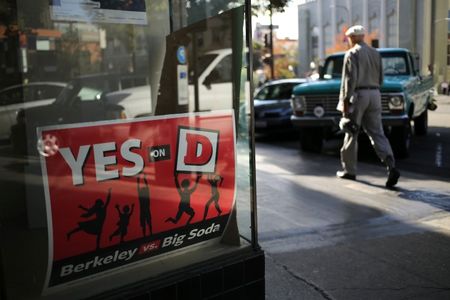By Ann Saphir
BERKELEY Calif. (Reuters) - The California city of Berkeley overwhelmingly approved the first U.S. ballot measure to tax sugary soft drinks, but while supporters hope it will unleash similar efforts nationwide, organizers of the measure said their grassroots effort would not be easy to duplicate.
The success on Tuesday by famously liberal Berkeley follows a string of failures to tax soda, including in nearby Richmond, California, in 2012.
Berkeley's new law will impose a 1-cent-per-ounce tax on sugar-sweetened beverages. But a similar measure in nearby San Francisco was defeated on Tuesday, highlighting continuing challenges for future efforts.
Berkeley council member Linda Maio, one of the measure's key backers, credited the success to lessons learned from Richmond's failure, as well as local planning focused on her city.
For other cities, she plans a primer that will include pointers on private polling, building a base of volunteers, and messaging, which in Berkeley's case revolved around the impact diabetes has on the African American community.
The local branch of the National Association for the Advancement of Colored People was one of the early supporters of the measure.
"Other towns would have to tailor for their own situation," making it unlikely that Berkeley's soda tax victory would be quickly replicated, Maio said.
Former New York Mayor Michael Bloomberg donated $647,000 to Berkeley's campaign, facing off against soft drink makers that spent more than $2 million.
Bloomberg aide Howard Wolfson called the vote a victory for public health. "We stand ready to assess and assist other local efforts," he said.
Bloomberg's efforts to limit soda sales in the nation's largest city were thwarted by a legal challenge from the soda industry.
American Beverage Association spokesman Christopher Gindlesperger said Berkeley's effort was a case of "venue-shopping" by soda-tax advocates who have little support elsewhere in the nation.
"By no means does that Berkeley's passing a soda tax portend a trend," he said.
Maio and other organizers, including public health activist Vicki Alexander, say they spent more than a year planning the effort, meeting repeatedly with Richmond organizers, who told them what to prepare for, including an onslaught of anti-tax ads.
Despite early entreaties from Berkeley organizers for help, Bloomberg's donation only came late in the game, Alexander said. The group focused instead on winning the backing of influential local groups.
And early on, the Berkeley campaign was intent on independence.
When consultants for a San Francisco's soda tax measure showed up at a Berkeley planning session earlier this year to offer their input, they were turned away at the door.
Now, with success behind them, Alexander and Maio hope their primer will help guide others.
University of California, Berkeley professor Robert Reich said the ballot measure's success could turn the national tide toward taxing soda, however slowly.

"A lot of people out there who are in contact with a lot of grassroots groups are watching Berkeley very closely," he said.
(Addiitonal reporting by Anjali Athavaley in New York; Editing by Lisa Von Ahn)
